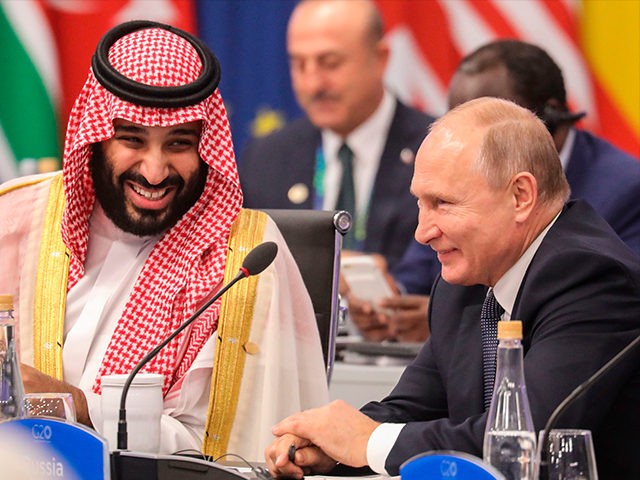The amount of Russian fuel oil imported by Saudi Arabia between April and June of this year more than doubled compared to last year, Reuters reported Friday.
“Data obtained by Reuters through Refinitiv Eikon ship tracking showed Saudi Arabia imported 647,000 tonnes (48,000 barrels per day) of fuel oil from Russia via Russian and Estonian ports in April-June this year. That was up from 320,000 tonnes in the same period a year ago,” the news agency reported on July 15.
Detailing the significance of the recent sales figures, Reuters wrote:
The increased sales of fuel oil, used in power generation, to Saudi Arabia show the challenge that U.S. President Joe Biden faces as his administration seeks to isolate Russia and cut its energy export revenues.
While many countries have banned or discouraged purchases from Russia, China, India and several African and Middle Eastern nations have increased imports.
Biden was on Friday visiting Saudi Arabia and was expected to seek an increase in oil supply to global markets from the kingdom to help to lower oil prices that have aggravated inflation worldwide.
The U.S. and other Western-allied nations have scaled back their Russian energy purchases since late February after Moscow launched its latest war with neighboring Ukraine. India and China have stepped in to fill this trade gap.
“The world’s second-biggest economy [China] imported about 8.42 million tons of oil from Russia last month, a 55% rise from a year ago,” Agence France-Presse (AFP) reported June 23.
“India bought six times more Russian oil from March to May compared with the same period last year,” AFP further noted, citing data from the research firm Rystad Energy.
Russia is reportedly selling its oil at steep discounts amid a Western boycott of the product. The low price point has allowed Moscow to skirt the intended effects of the embargo so far. Reuters reported on May 25 that Russian oil exports had not fallen to date despite a Western sanctions campaign against Moscow in response to its ongoing war with Ukraine. Many international traders have avoided buying Russian oil since the conflict launched on February 24 due to the sanctions’ secondary effects, such as disruptions to shipping procedures and payment systems.
Washington led the West in imposing a raft of financial sanctions on Russian companies and entities in late February to punish Moscow for invading Ukraine. The campaign has severely hampered Russian business transactions, including oil sales.
Saudi Arabia holds 15 percent of the world’s proven oil reserves and ranks as the top oil exporter globally. The Kingdom boasts the world’s “largest crude oil production capacity at nearly 12 million barrels per day,” according to U.S. Energy Information Administration (EIA). The EIA estimated Saudi Arabia’s crude oil production at 9.8 million barrels per day as of October 2021.
Riyadh has recently indicated a reluctance to increase its oil production, an action unofficially sought by Western leaders including U.S. President Joe Biden to reduce record-high fuel prices in countries such as the U.S.
Saudi Energy Minister Prince Abdulaziz bin Salman said on March 29 that attacks on Saudi oil facilities by Yemen’s Houthi terrorists in previous days had compromised Riyadh’s ability to provide the world with sufficient fuel supplies.
The Saudi energy minister referenced “attacks by Yemen’s Iran-backed Huthi rebels on Saudi oil facilities, including a wave of drone and missile strikes on Friday [March 25],” AFP reported at the time.
Bin Salman said the nefarious acts had “put into question our ability to supply the world with the necessary energy requirements.”

COMMENTS
Please let us know if you're having issues with commenting.